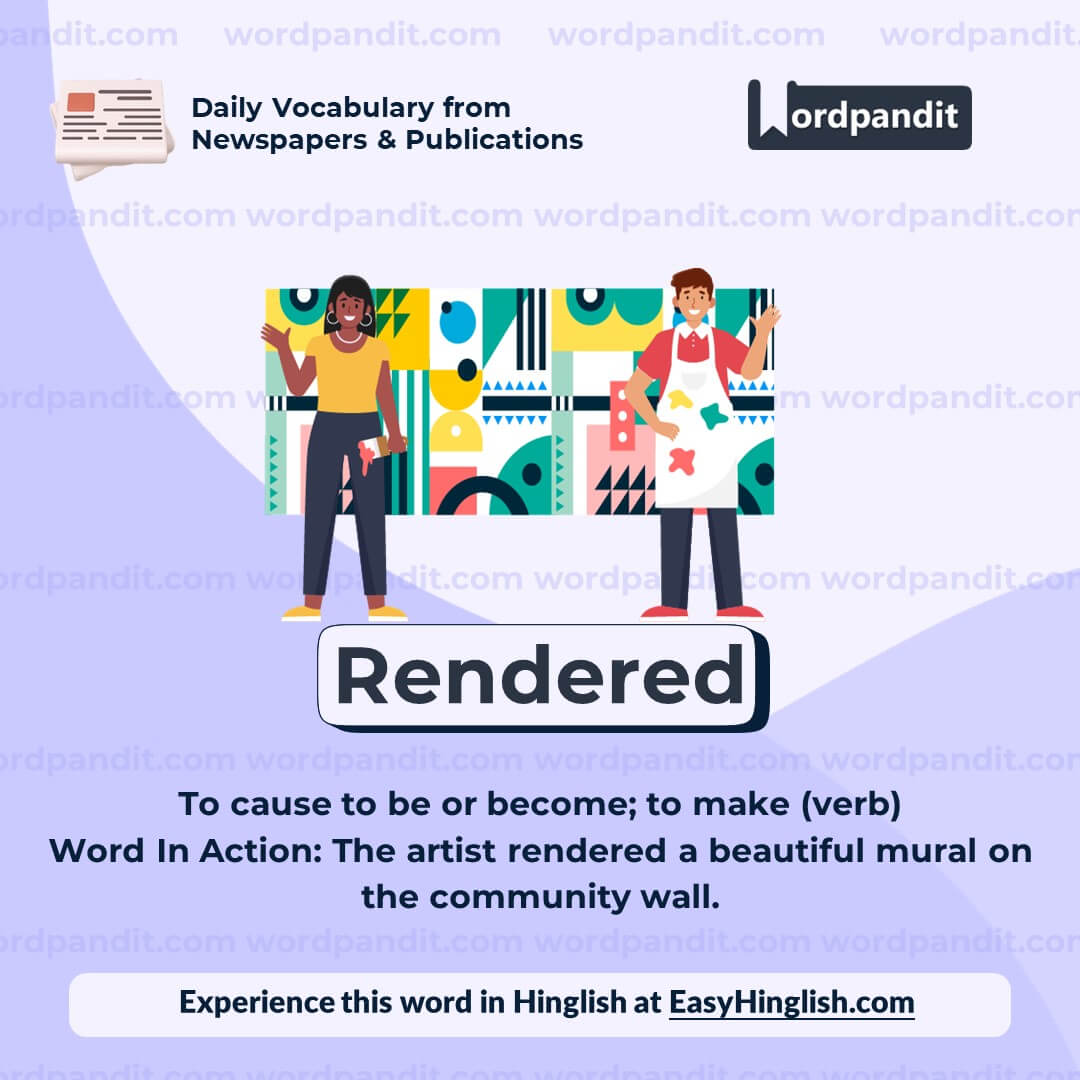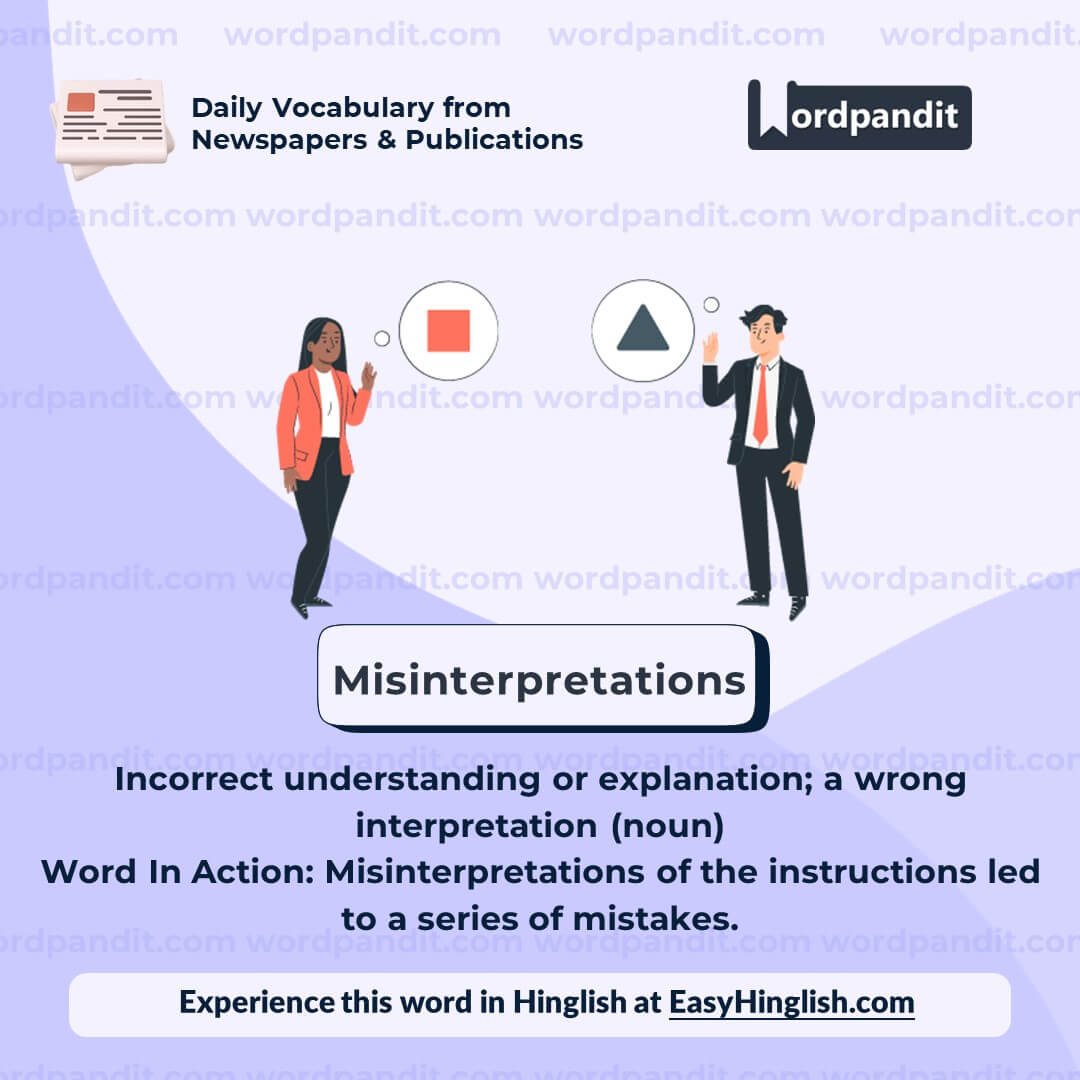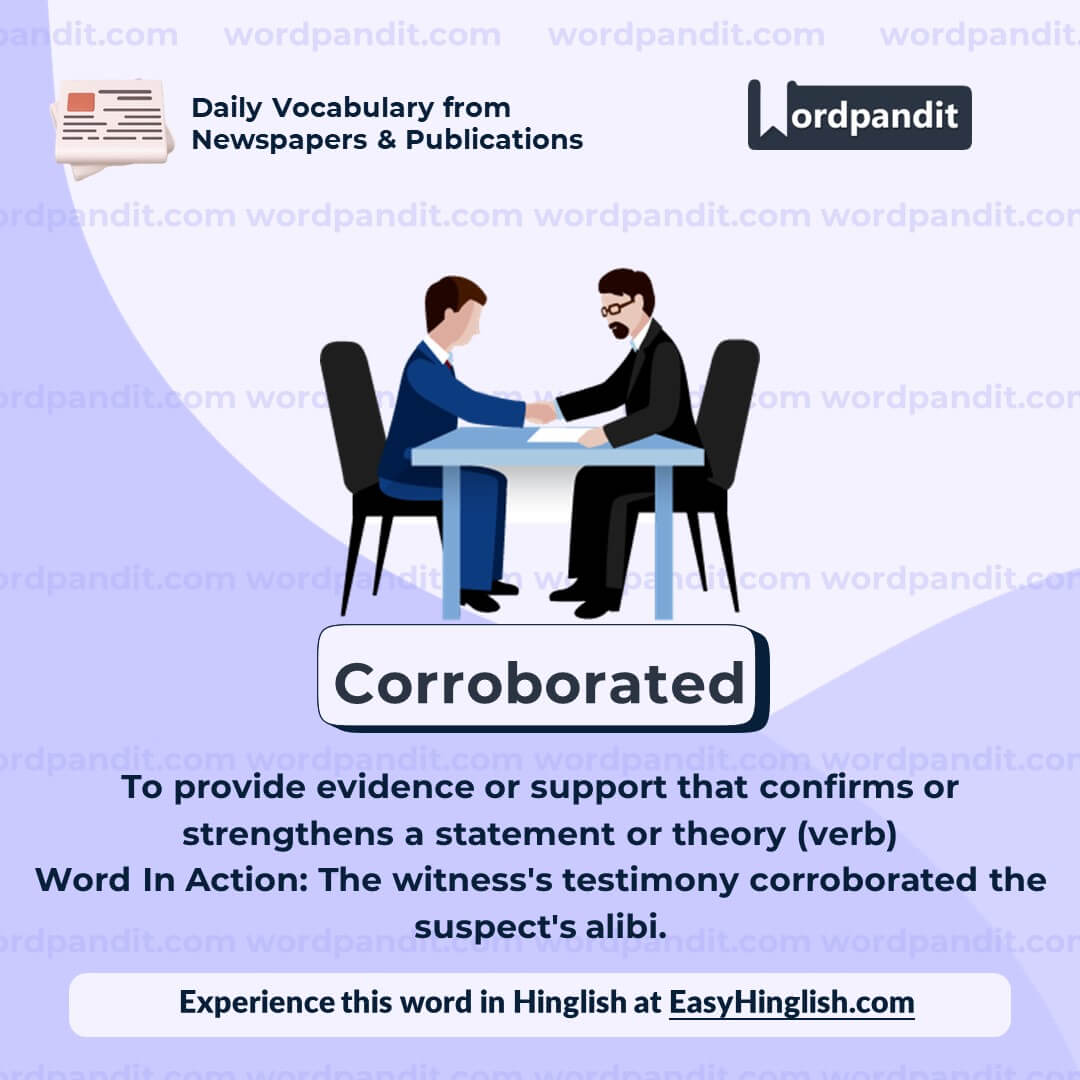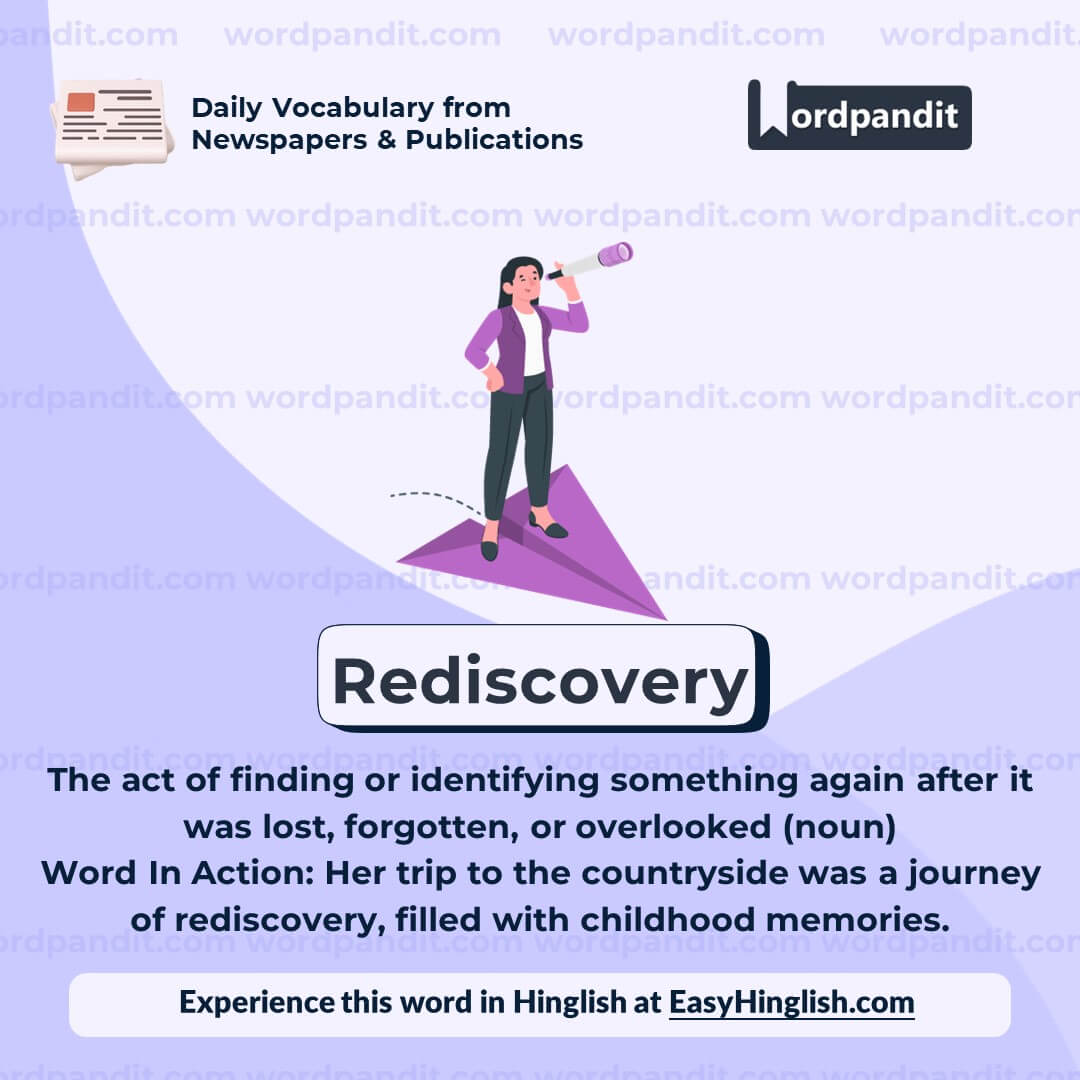Daily Vocabulary from Indian Newspapers and Publications
Welcome to Wordpandit’s Indian Vocabulary Hub
At Wordpandit, we understand the importance of staying rooted in the local context while expanding your language skills. This section focuses on enriching your vocabulary with words and phrases drawn from India’s leading newspapers and publications, ensuring you're learning vocabulary that is practical, relevant, and uniquely Indian.
Why Indian Sources Matter
We believe that the best way to master any language is by immersing yourself in local content. That’s why we carefully curate vocabulary from top Indian publications, including:
- The Hindu
- The Times of India
- The Economic Times
- Hindustan Times
- Live Mint
- The Indian Express
- And many others...
Stay Updated, Stay Relevant
With daily updates from Indian news sources, you’ll be consistently learning words that reflect the trends and shifts in Indian society and culture. Our focus is to provide vocabulary that enhances your understanding of the language in an Indian context.
How Wordpandit Supports Your Goals
Whether you’re preparing for exams, aiming to improve your professional communication, or simply want to stay connected with the latest Indian vocabulary, Wordpandit is here to guide you every step of the way.
Learn with a Practical Approach
Our interactive learning methodology includes real-world examples, engaging activities, and context-specific usage to ensure that every word becomes part of your active vocabulary.
Dive into Indian Vocabulary Today!
Why Choose Wordpandit?
Practical Learning: Focus on words you'll actually encounter in real-world reading, enhancing your comprehension and communication skills.
Diverse Content: From current affairs to scientific breakthroughs, our varied sources expose you to vocabulary across multiple domains.
Effortless Integration: Make Wordpandit a part of your daily routine. Just a few minutes each day can significantly boost your lexicon over time.
Your Path to Vocabulary Mastery
- Visit our Daily Vocabulary section regularly
- Explore new words and their usage in context
- Practice incorporating these words into your own writing and speech
- Track your progress as your vocabulary expands
Start Your Journey Today
Embark on your vocabulary enhancement journey with Wordpandit. By consistently engaging with our daily posts, you'll build a robust vocabulary that serves you well in academic, professional, and personal contexts.
Remember, a word a day keeps linguistic limitations at bay. Make Wordpandit your daily companion in the quest for vocabulary excellence!
WORD-1: Rendered
Context:
"A method called continuous flash suppression, these faces were rendered temporarily invisible by presenting them to one eye only and with a rapidly flashing pattern (a visual mask) presented to the other eye." - The Wire
Explanatory Paragraph:
The word "rendered" refers to the act of causing something to become or appear in a certain state. In the given context, it describes how the faces were made temporarily invisible using a specific visual technique.
Meaning: To cause to be or become; to make (verb)
Pronunciation: REN-derd
Difficulty Level: ⭐⭐⭐ Intermediate
Etymology: Derived from the Old French word "rendre," meaning "to give back, yield," which originates from the Latin "reddere," meaning "to give back, return."
Synonyms & Antonyms:
Synonyms: caused, made, depicted, portrayed, presented
Antonyms: concealed, withheld, obscured
Usage Examples:
- The artist rendered a breathtaking scene of the countryside in her painting.
- The new software rendered the image with stunning clarity and precision.
- His kind gesture rendered everyone speechless in admiration.
- After hours of cooking, the fat was rendered and used to enhance the flavor of the dish.
Cultural Reference:
"Render unto Caesar the things that are Caesar’s, and unto God the things that are God’s" is a famous phrase from the Bible, Matthew 22:21. It refers to the idea of giving each their due, often quoted in discussions about responsibility and division of duties. - Bible, Matthew 22:21
Think About It:
How does the concept of "rendering" apply to creative fields such as art, design, or storytelling? Can you think of an example where something was "rendered" in a surprising or unexpected way?
Quick Activity:
Write a short paragraph describing how something is "rendered" in a process you are familiar with, such as preparing a meal, creating a digital image, or explaining an abstract idea.
Memory Tip:
Remember "rendered" by associating it with "to make real or visible," like a 3D rendering in animation where a design is brought to life.
Real-World Application:
The term "rendered" is frequently used in technology, particularly in graphics and animation, where images or scenes are "rendered" into a viewable form. It is also used in legal contexts to describe delivering a verdict or decision.
WORD-2: Misinterpretations
Context:
"Differences of policy and principles are sprinkled with lies, half-truths and misinterpretations to project Nehru as the biggest villain in the history of modern Indian politics." - The Wire
Explanatory Paragraph:
The word "misinterpretations" refers to incorrect or false understandings or explanations of something. It is often used when someone misunderstands or distorts the intended meaning of words, actions, or ideas, either unintentionally or deliberately. In the context provided, it suggests deliberate distortions of facts to create a false narrative about Nehru.
Meaning: Incorrect understanding or explanation; a wrong interpretation (noun)
Pronunciation: mis-in-ter-pruh-TAY-shunz
Difficulty Level: ⭐⭐⭐ Intermediate
Etymology: From the prefix "mis-" meaning "wrongly" and "interpretation," which comes from the Latin "interpretatio," meaning "explanation" or "expounding."
Synonyms & Antonyms:
Synonyms: misunderstandings, distortions, misconceptions, misreadings
Antonyms: clarifications, explanations, understandings, truths
Usage Examples:
- His speech was taken out of context, leading to widespread misinterpretations of his true intentions.
- The historical event has been plagued by misinterpretations, causing confusion among students.
- The misinterpretations of the law led to an unnecessary dispute between the two parties.
- She clarified her statement to avoid any misinterpretations during the meeting.
Cultural Reference:
The concept of "misinterpretation" is central to Shakespeare’s plays, where misunderstandings drive the plot. For instance, in "Much Ado About Nothing," the misinterpretation of events creates comedic and dramatic tension. - Shakespeare, "Much Ado About Nothing"
Think About It:
Why do you think misinterpretations occur so frequently in politics, media, and history? What steps can individuals take to avoid falling victim to them?
Quick Activity:
Think of a situation where you or someone you know misinterpreted something. Write a short description of the event and how it was resolved.
Memory Tip:
To remember "misinterpretations," think of the prefix "mis-" as a clue for something wrong and "interpretation" for explanation. Together, they mean a "wrong explanation."
Real-World Application:
The term "misinterpretations" is commonly used in law, history, and communication, where incorrect understandings can lead to significant consequences. It reminds us to seek clarity and verify information to avoid errors in understanding.
WORD-3: Refrain
Context:
"His constant refrain remains, 'Nothing is going on records.'" - The Wire
Explanatory Paragraph:
The word "refrain" has two primary meanings. As a noun, it refers to a repeated phrase or comment, often used in speech or writing, or in a song's chorus. In the given context, it signifies a repeated statement or message that the person keeps reiterating. As a verb, it means to hold back or restrain oneself from doing something. Here, the noun usage is implied, focusing on the repetition of the phrase.
Meaning: A repeated phrase or comment, often in speech, writing, or music (noun); to hold back from doing something (verb)
Pronunciation: ri-FRAYN
Difficulty Level: ⭐⭐⭐ Intermediate
Etymology: From Old French "refrain" meaning "chorus," derived from the Latin "refringere," meaning "to break back," which evolved into the sense of repetition in music and speech.
Synonyms & Antonyms:
Synonyms: (noun) repetition, chorus, mantra; (verb) abstain, avoid, desist
Antonyms: (noun) silence, omission; (verb) indulge, proceed, act
Usage Examples:
- Her favorite refrain from the song echoed in her head all day long.
- The teacher's constant refrain was, "Practice makes perfect."
- He refrained from commenting further to avoid escalating the argument.
- Despite the temptation, she refrained from eating dessert during the diet challenge.
Cultural Reference:
In literature and poetry, a refrain is a recurring line or group of lines, often used to create rhythm or emphasize an idea. For example, in Edgar Allan Poe's poem "The Raven," the word "Nevermore" acts as a refrain, reinforcing the melancholic tone of the poem. - Edgar Allan Poe, "The Raven"
Think About It:
Why do you think people use refrains, whether in conversation, writing, or music? How do repeated phrases or actions influence our perception of a message?
Quick Activity:
Write a sentence or short paragraph where you use "refrain" both as a noun and as a verb. For example: "Despite the repeated refrain of 'Just do it,' she refrained from making a decision."
Memory Tip:
Think of "refrain" as related to "repetition" (noun) or "restrain" (verb). The word has both meanings: something repeated like a chorus or holding back from an action.
Real-World Application:
The word "refrain" is commonly used in music, literature, and everyday conversations. As a noun, it helps to emphasize repeated messages or ideas, while as a verb, it conveys self-discipline and restraint, which is crucial in professional and personal relationships.
WORD-4: Corroborated
Context:
"Refers to the act of providing support or evidence to strengthen or confirm something." - The Wire
Explanatory Paragraph:
The word "corroborated" refers to the process of providing evidence or support to confirm or strengthen a claim, statement, or theory. It is often used in legal, scientific, or investigative contexts where proof is needed to validate something. For instance, if a witness's testimony is corroborated by physical evidence, it gains credibility.
Meaning: To provide evidence or support that confirms or strengthens a statement or theory (verb)
Pronunciation: kuh-ROB-uh-ray-ted
Difficulty Level: ⭐⭐⭐ Intermediate
Etymology: Derived from the Latin word "corroboratus," meaning "to strengthen or make strong," from "com-" (together) and "roborare" (to strengthen), which comes from "robur," meaning "strength."
Synonyms & Antonyms:
Synonyms: confirmed, validated, supported, substantiated, authenticated
Antonyms: contradicted, refuted, disproved, invalidated
Usage Examples:
- The detective's theory was corroborated by new forensic evidence found at the crime scene.
- The witness's testimony was corroborated by security camera footage.
- The research findings were corroborated by multiple independent studies.
- Her alibi was corroborated by her coworkers, proving her innocence.
Cultural Reference:
In investigative journalism, corroboration is critical. For instance, Bob Woodward and Carl Bernstein, who investigated the Watergate scandal, corroborated their findings with multiple reliable sources before publishing. This meticulous corroboration ultimately uncovered one of the biggest political scandals in U.S. history. - Watergate Scandal, 1972
Think About It:
Why is corroboration so essential in fields like law, journalism, and science? How can failing to corroborate information lead to misinformation or injustice?
Quick Activity:
Think of a time when you had to prove a point or defend an argument. Write down what evidence or support you used to corroborate your claim.
Memory Tip:
Remember "corroborated" by breaking it down into "co-" (together) and "robust" (strong), which reminds you of "making something strong with supporting evidence."
Real-World Application:
The word "corroborated" is widely used in legal and investigative work, where claims must be supported with evidence. It is also significant in academic research, where findings must be corroborated through peer review or additional studies to establish validity.
WORD-5: Rediscovery
Context:
"It was then that the famous rediscovery I mentioned above of an orchid species originally collected in Malabar by Jerdon and studied and named by the German botanist Heinrich Gustav Reichenbach (1862) happened." - The Wire
Explanatory Paragraph:
The term "rediscovery" refers to the act of finding or identifying something again after it was forgotten, lost, or overlooked for a period of time. In the given context, it describes the reidentification of an orchid species that had been previously discovered, documented, and studied in the past but was later rediscovered in the present.
Meaning: The act of finding or identifying something again after it was lost, forgotten, or overlooked (noun)
Pronunciation: ree-dih-SKUH-vuh-ree
Difficulty Level: ⭐⭐⭐ Intermediate
Etymology: From the prefix "re-" meaning "again" and "discovery," which derives from the Old French "descovrir," meaning "to uncover, disclose, or reveal."
Synonyms & Antonyms:
Synonyms: reidentification, revival, unearthing, reexamination
Antonyms: loss, neglect, oversight, obscurity
Usage Examples:
- The rediscovery of ancient manuscripts shed new light on the history of the region.
- Her trip to her childhood home was a personal rediscovery of memories she thought she had lost.
- The species, thought to be extinct, was found again in a remarkable rediscovery by conservationists.
- Through meditation, he experienced a rediscovery of his inner peace and purpose.
Cultural Reference:
One of the most famous rediscoveries in history is the finding of the city of Machu Picchu by Hiram Bingham in 1911. Although locals knew about its existence, it had been forgotten by the outside world until its rediscovery sparked global fascination. - Rediscovery of Machu Picchu, Peru, 1911
Think About It:
Why do you think rediscoveries often capture people's imagination more than initial discoveries? Can rediscoveries be more valuable than the original discoveries?
Quick Activity:
Write about something you "rediscovered" in your life, such as a hobby, book, or memory, and how it felt to reconnect with it.
Memory Tip:
Remember "rediscovery" by breaking it into "re-" (again) and "discovery" (finding something new). Together, it means finding something again that was forgotten.
Real-World Application:
The concept of "rediscovery" is important in fields like science, history, and art. Rediscovered medicines, artifacts, or cultural practices can often solve modern problems or provide deeper insights into human history.


















